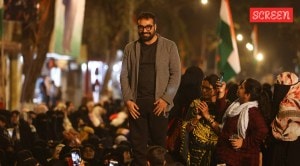Advani just gave Manmohan political cover to push peace
Whatever might be his motivation or the personal price he has to pay for the “new speak” on Pakistan’s founder Mohammad Ali J...

Whatever might be his motivation or the personal price he has to pay for the “new speak” on Pakistan’s founder Mohammad Ali Jinnah, BJP leader L K Advani has irrevocably altered the discourse on Pakistan.
Praising Jinnah for his ideal of a secular Pakistan, he has signalled unambiguously that mainstream India has come to terms with the Partition of the Subcontinent.
So as a national debate on Jinnah, the Partition and the nature of Pakistan unfolds, Prime Minister Manmohan Singh has a huge opportunity to boldly experiment with new ideas on resolving the Jammu and Kashmir question and accelerate the normalisation of ties with Pakistan.
It is not often that a leader of the opposition provides such a big political cover for the Prime Minister on a sensitive national security issue. But then these are no ordinary times in Indo-Pak relations.
The cognoscenti in both countries was aware that Advani’s long-awaited visit to Pakistan would indeed be interesting. Pakistan’s President Pervez Musharraf was keen that the BJP in opposition, and especially Advani, seen in Pakistan as a hardliner, will not come in the way of the peace process the NDA had initiated.
In India the hopes were no different. But few had believed Advani would generate a political tsunami in Pakistan.
Sparking off the tidal wave was Pakistan’s decision to ask Advani to inaugurate the reconstruction of a temple near Lahore. Don’t miss the political symbolism.
Here is Pakistan, long seen as irreconcilably anti-Hindu, rebuilding a temple. And there was Advani, indelibly tainted with the demolition of the Babri Masjid, associating himself with the reconstruction of a temple in Pakistan.
It had to be a moment of transformation. It shattered India’s popular image of Pakistan as a crazy theocracy. And Advani’s reaction destroyed the perception across the border that much of India was irreconcilably opposed to the creation of Pakistan.
For decades, Indian and Pakistani establishments specialised in bringing out the worst in each other. Now for a change, small but sensitive gestures are letting them bring out the unexpected best from the other.
By bridging the distance between the middle ground in both countries, Advani’s sojourn in Pakistan will eventually help isolate the few extremist elements in both countries that have had a free run all these decades.
The political space for extremism was created over decades by mainstream political trends in both the countries that reveled in demonising each other.
By simplifying history and steadily cutting off links between the two civil societies since the 1965 war, the national security establishments in both the capitals made it impossible for ordinary people to know any better.
In India long before the BJP came to power, Pakistan was depicted as the unacceptable other. India was secular, Pakistan not; India a democracy and Pakistan an autocracy; New Delhi’s foreign policy was progressive, and Pakistan’s regressive.
Curiously it fell upon the right wing BJP and its prime minister, Atal Bihari Vajpayee, to break new ground on Pakistan. Despite great provocations and against all odds, Vajpayee had persisted with the attempts to normalise relations with Pakistan during 1998-2004. “You can choose your friends, not neighbours”, Vajpayee used to say.
Now Advani has gone way forward by publicly asserting and standing by what was implicit in Vajpayee’s policy—Pakistan need not be India’s enemy any longer.
The new framework that Vajpayee left behind for engaging Pakistan in January 2004 was confined to the two governments. Advani has now drawn the two nations into the peace process by demanding a change in the entrenched mindsets across the border.
Photos


- 01
- 02
- 03
- 04
- 05





























